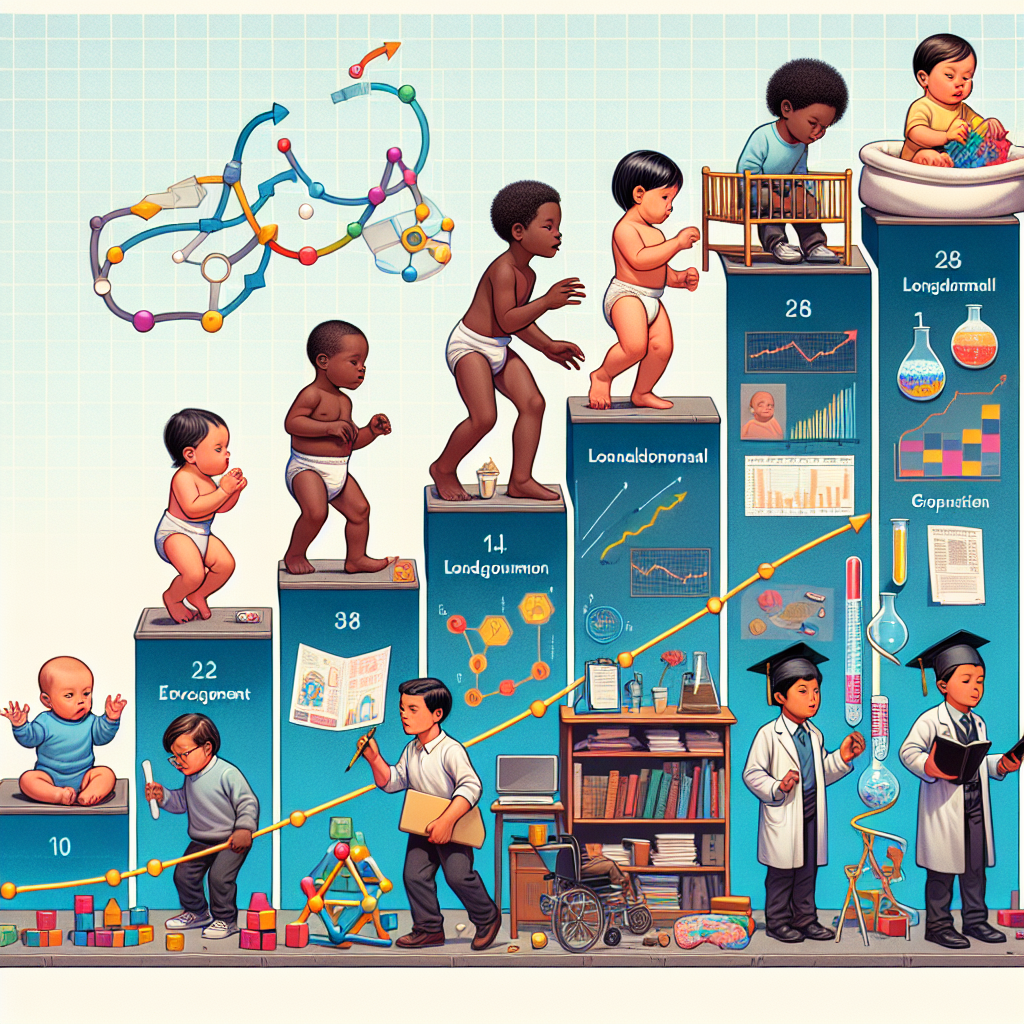
Introduction
Imagine witnessing a flower bloom, petal by petal, observing every minute change as it unfolds. This imagery is a fitting metaphor for understanding childhood development, a complex process that requires careful observation over time. Life in Stages: How Longitudinal Research Shapes Our Understanding of Childhood Development forms the backbone of insights into how we grow, learn, and change during those formative years.
Longitudinal research offers us a lens through which we can closely examine the trajectory of children’s development, providing invaluable insights that can revolutionize our approaches to education, parenting, and mental health. As we delve deeper into this essential topic, we’ll uncover how this type of research informs policies, improves educational practices, and shapes the future of child development.
Understanding Longitudinal Research
What is Longitudinal Research?
Longitudinal research involves repeated observations of the same variables over long periods. Unlike cross-sectional studies, which provide a snapshot at a single point in time, longitudinal studies capture change and continuity in development. This methodology is pivotal for understanding childhood development as it reveals how experiences and environmental factors impact growth over time.
The Importance of Life in Stages
The concept of "Life in Stages" emphasizes the phase-specific development that children go through. Longitudinal research enables us to dissect these stages, uncovering the various influences that affect them. For instance, researchers can track cognitive development from infancy through adolescence, identifying critical periods for language acquisition, social skills, or emotional resilience.
Key Features of Longitudinal Studies
| Feature | Description |
|---|---|
| Repeated Measures | Participants are observed multiple times. |
| Extended Time Frames | Data collected over years allows for comprehensive analysis. |
| Cohort Studies | Focus on specific groups experiencing similar events or conditions. |
| Individual Trajectories | Enables tracking of individual development patterns over time. |
Case Studies in Longitudinal Research
The Dunedin Multidisciplinary Health and Development Study
One of the most notable longitudinal studies is the Dunedin Multidisciplinary Health and Development Study (also known as the Dunedin Study), which has tracked 1,037 individuals born in Dunedin, New Zealand, in 1972-1973.
Relevance and Findings
- Social Development: The Dunedin Study provided insights into how childhood behavior can predict adult mental health and social outcomes. For example, children who display aggressive behavior patterns often face challenges later in life related to mental health and social integration.
- Health Outcomes: Results also show that childhood experiences significantly influence adult health. This underscores the importance of early interventions in education and health, shaping policies that prioritize emotional and social intelligence, vital for overall well-being.
The National Institute of Child Health and Human Development Study (NICHD)
The NICHD Study provides valuable data on child development in relation to various factors such as family environment, diet, and early education.
Key Insights
- Parental Influence: The study illustrated how different parenting styles affect children’s socio-emotional outcomes. Children raised in nurturing environments displayed better emotional regulation compared to those in harsher settings.
- Early Education: Findings from the NICHD Study highlight the impact of preschool education on cognitive development, showcasing how early learning opportunities set the stage for later academic success.
How Longitudinal Research Shapes Educational Practices
Curriculum Development
Longitudinal research has the power to inform educational systems, encouraging the development of curricula that address various stages of childhood development. Educators can tailor teaching styles and material to fit the evolving needs of students, ensuring a supportive learning environment.
Policy Formation
Insights gathered from longitudinal studies help shape education policy. For instance, if research shows a critical window for language acquisition between ages 2-6, policymakers may prioritize the implementation of early literacy programs.
Successful Interventions
Longitudinal research has led to the design of targeted interventions for at-risk children. Programs tailored to enhance social-emotional learning, based on data from children’s development pathways, provide crucial support, promoting resilience and healthier life choices.
Key Findings from Longitudinal Research
Cognitive Development and Milestones
- Early Literacy Skills: Children exposed to reading at a young age demonstrate advanced vocabulary and cognitive skills, established through longitudinal observations.
- Mathematical Skills: Longitudinal studies have shown that early exposure to math concepts correlates to better math skills later in childhood and adulthood.
Social-Emotional Development
- Peer Relationships: Long-term observations reveal that children who cultivate strong peer relationships early on tend to manage stress better and adapt more easily in various social settings.
- Psychological Well-being: Tracking emotional development has illuminated how early adverse experiences contribute to long-term mental health challenges, affirming the critical nature of emotional support during formative years.
Health Outcomes
- Long-Term Effects of Nutrition: Dietary habits established in childhood are linked to adult obesity and health conditions. Longitudinal studies help emphasize the importance of addressing nutritional education.
- Physical Activity: Studies have shown that children who engage in regular physical activity consistently display better mental health, establishing the importance of structured playtime in education systems.
Integrating Findings into Practice
Professional Development for Educators
Training programs grounded in the findings of longitudinal research can equip educators with the necessary skills to recognize and support different developmental stages. Workshops focused on understanding cognitive and emotional development will empower teachers to engage with students effectively.
Parent Involvement
Parents play a crucial role in child development. Longitudinal research emphasizes the impact that active parenting and involvement in educational activities have on a child’s overall growth. Workshops and resources can be developed to engage parents in understanding the importance of their involvement.
Community and Policy Initiatives
Community programs can be designed to address the socio-economic barriers identified through longitudinal research. Societal structures should facilitate access to resources that support healthy childhood development, from early education to mental health services.
Conclusion
Life in Stages: How Longitudinal Research Shapes Our Understanding of Childhood Development offers profound insights that resonate deeply with educators, parents, and policymakers. By tracking individual children over time, longitudinal studies illuminate the intricate tapestry of childhood development, revealing the interplay between environment, lifestyle, and education.
As we embrace the findings from these extensive studies, we stand to improve the lives of future generations. Let each revelation inspire us to take action, develop better practices, and implement effective policies that nurture every child’s potential. The question remains: What will you do with this knowledge to help shape brighter futures?
FAQs
1. What is longitudinal research?
Longitudinal research is a study that involves repeated observations of the same participants over an extended period, allowing researchers to analyze changes and continuities in specific variables.
2. What are the benefits of using longitudinal research in childhood development?
Longitudinal research provides comprehensive insights into how children develop over time, helps identify critical periods for intervention, and informs effective educational and parenting strategies.
3. How can findings from longitudinal research be applied in educational settings?
Findings can inform curriculum development, shape teacher training, and guide policies aimed at supporting child development stages effectively.
4. What role do parents play in a child’s development according to longitudinal studies?
Parents significantly influence a child’s emotional and cognitive growth. Research indicates that active parental involvement fosters better developmental outcomes.
5. Why is it essential to focus on childhood development?
Focusing on childhood development is vital because early experiences significantly affect long-term mental health, educational success, and overall well-being, highlighting the need for supportive interventions.
By examining Life in Stages: How Longitudinal Research Shapes Our Understanding of Childhood Development through real-world case studies and maintaining a conversational tone, this article strives to provide an engaging and informative experience for readers interested in child development and education.














